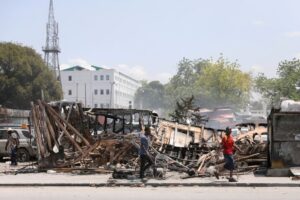This article was translated into English by Panos Petrou.
The elections of May 21st were indeed a “political earthquake”, one which produces after-effects that we will need to reverse with determined and systematic political struggle.
- [Prime Minister Kyriakos] Mitsotakis achieved an actual political victory. The scale of this victory took unexpected dimensions because of the collapse of SYRIZA’s policy.
The social pillar that supported this political achievement of the Right was the mobilization of the ruling class and the affluent upper-middle classes, with their potential to pull along with them a certain broader audience. The economic and social policy of Mitsotakis provided the opportunity for a blood-stained rise in the profitability of major capitalist groups, while the distribution of 50 billion euros of European funds and 10 billion euros in “direct commissions” (from the state to private enterprises) provided the opportunity for an even wider “party” in the broader ranks of business owners.
This ruling class’ support for Mitsotakis has not been an easy, given, hypothesis. During the moments of the major failures of the government after 2019 (in the tragic death toll of the pandemic, in the surveillance scandal, in the deadly train crash at Tempi), questions and doubts had been raised about the political potential of the leadership of Mitsotakis in New Democracy. These took the form of preparations for the possibility of a “broader consensus” government.
These considerations and preparations were reserved in the background, in anticipation of the electoral test of strength. Yet the sense of imminent risks for Greek capitalism in the foreseeable future, morivated the capitalists and their broader social allies to rally around Mitsotakis and New Democracy in a more determined fashion—supporting the party that would insist on neoliberal counter-reforms with the minimum ideological-political contradictions or reservations.
It is on this ground that Mitsotakis built a harsh and robust electoral campaign for New Democracy. He didn’t hide the intent to accelerate neoliberal counter-reforms. He didn’t hide the building of the “fence” in land border with Turkey in Evros, the pushbacks against refugee boats in the Aegean Sea, the massive armaments program etc, instead he advertised all these policies. This campaign was proven successful in adding specific targeted layers to the electoral support for Mitsotakis, mostly because it didn’t face a massive and convincing counter-position from the part of the opposition and mainly SYRIZA.
This is how the prospect of a new mandate for Mitsotakis with an absolute parliamentary majority emerged, despite his successive attacks and his cynical disregard in all issues that relate to the well-being of the vast majority of workers and the subaltern classes.
- The leadership of SYRIZA chose to try and confront Mitsotakis on his own playing field: competing on the non-political and vague criteria of who is more “suitable for office”. They withdrew from the electoral contest all features, colors and symbols of the Left. They avoided any cutting edge of class reference, opting to promise win-win “solutions” that could (supposedly) make everyone happy. They downgraded any concrete commitments that could mobilize the world of labor. The highly ambiguous —but central in SYRIZA’s campaign—choice to claim a “progressive-democratic” government remained a foggy nebula until the very end, since Tsipras avoided to define (or try to impose…) any concrete programmatic content to it, even when addressing the most obvious interlocutor for such a goal, that is PASOK under Nikos Androulakis.
All these highlighted further the main disadvantage of Alexis Tsipras’ SYRIZA: the question of credibility. The “dues” of the betrayal in 2015 and the bitter memories of workers and pensioners from SYRIZA’s government in 2015-2019 (e.g., the reactionary pension reform by then minister Katrougalos) had not been “paid” by SYRIZA’s leaders.
The end result was an unprecedented crisis of demobilization for SYRIZA’s electoral supporters. There was an “everyone fall out of formation, break the ranks!” effect, that pushed SYRIZA bellow the minimum predictions in opinion polls, while New Democracy was surging above the maximum predictions in opinion polls, showcasing Tsipras’ tactics as the main factor for the substantial political victory of Mitsotakis.
The fact that hundreds of thousands of people withdrew their political allegiance from it—as displayed in the polls on 5/21—leads SYRIZA to a different political position: From the elections in June and onwards, SYRIZA’s position as the main force in the opposition will be challenged and put into question.
- In the elections on 5/21, we have witnessed PASOK’s return as an active political force. The dynamic of this tendency will be judged in the elections of June, but also by the developments inside SYRIZA, that are bound to proceed after the election.
This is yet another “sponsorship” from Al. Tsipras: SYRIZA’s turn towards allying with European Social-Democrats after 2015 was effectively enhancing the potential of their local “branch” to survive.
The reinforcement of PASOK’s leadership under Nikos Androulakis complicates the relationship between the two parties, but only temporarily: One should not underestimate the arguments raised both inside SYRIZA and inside PASOK about the prospect of a “social-democratic re-composition”.
- Facing the savage policy of Mitsotakis, and despite the sluggish, electoral-centered opposition of SYRIZA, there have been important struggles from below during the reign of New Democracy: the struggles in education and healthcare, the protests against state repression in the neighborhoods, schools and universities, some victorious strikes (in E-Food, in Cosco etc), the massive movement after the crime at Tempi and so on. These struggles formed the actual opposition, the most dangerous adversary that Mitsotakis had to face.
The electoral campaigns of the militant Left referred to this force.
The Communist Party achieved a noteworthy rise in its support, when compared with the elections of 2019. From 299,500 votes and 5.3%, to 425,000 votes and 7.23%. Objectively, this is an encouraging development, which we hope will persist and strengthen in the next election. But when compared with past results of the Communist Party (like the 536,000 votes and 8.48% of the vote in May 2012, which was the “doorstep” to the current political period) or when taking into account the massive losses of SYRIZA, this electoral score should not be considered as good enough. The organizational strength of the Communist Party should normally push for higher ambitions and the undertaking of bigger responsibilities in the scale of mass politics.
“MERA25-Alliance for the Rupture”, despite the predictions that pointed to the contrary, failed to pass the threshold to enter parliament by a small margin. We are hoping that this result will be “corrected” in the next election on 25th of June.
The forces of ANTARSYA and other ballots of the radical/anticapitalist Left, despite their active role in the mass movements, were yet again limited to “recording their presence”, polling well below 1%, that is considered a threshold for “visibility”. This electoral tactic, which had been repeated many times with the same results, should be reconsidered.
As far as we are concerned, we will address the next electoral battle with the same political direction we addressed May 21st: We call to vote for the militant Left, with the aim to reinforce the part of the opposition which can support in parliament the working-class struggles and the class interests of the majority of society.
- The political prospect that emerged from the elections on 5/21 is a governmental majority for the Right-wing party under Kyriakos Mitsotakis. There can be no doubt that this will be a menacing and extremely aggressive government. At the same time, the electoral results of the far right (more votes for “Greek Solution”, the emergence of a new party called “Victory” etc), serves as a reminder that those reactionary reserves of the system are always lurking.
But there can also be no doubt that this government will be unstable and vulnerable. 2024 will be a harsh test for Greek capitalism. The actual social balance of forces in Greek society is the one displayed after the crime at Tempi, with the inspiring mass protests and strikes. This reality will re-emerge to the foreground in the process of fighting back against the governmental policies, beyond the distorting lens of electoral procedures. Analyses that argue about a generalized “concretization” or “Orbanization” of Greek society are wrong or politically disorienting.
This is the prospect we need to reinforce on the ballots on 25th June:
- Vote against New Democracy and Mitsotakis
- No trust in SYRIZA and PASOK
- Vote Left
But most of all, we need to prepare ourselves from now to address the coming challenging period with a militant orientation to social resistance. In this field, the Left’s unity in action, in social and political struggles, will be the main feature for any serious and honest tactic.




